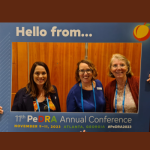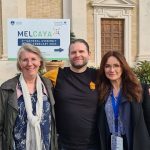MELCAYA
February 15-16, 2024. Rome
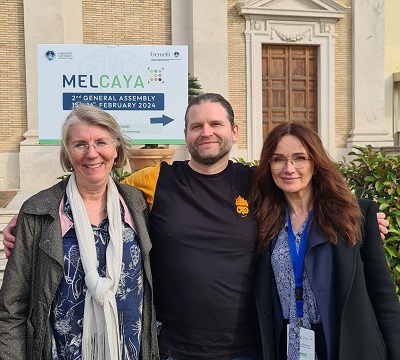
On February 15 and 16, 2024, Naevus Global (Nävus Netzwerk and Nevus Netwerk Nederland) attended the second MELCAYA general assembly in Rome. MELCAYA is the acronym for a European research consortium that stands for Melanoma in Children, Adolescents, and Young Adults.
Different working groups
Childhood melanoma is rare but does occur. Children with congenital birthmarks have a slightly higher risk. The challenge lies in its rarity. The few studies conducted are scattered and struggle with insufficient data. MELCAYA has initiated a major project linking various research efforts.
Twenty-one partner institutions are involved in this large European project. The MELCAYA meeting included participation from pediatric oncologists, pediatric dermatologists, melanoma oncologists, researchers, IT specialists, and healthcare organization specialists from different countries: Poland, Spain, Italy, France, Sweden, the Netherlands, Turkey, Israel, Austria, Romania, and Germany.
MELCAYA aims to accelerate and enhance the prediction and diagnosis of melanoma risk for children and young people, as well as make treatments more effective. The research comprises ten working groups. Each group presented during the meeting (more details on the MELCAYA website):
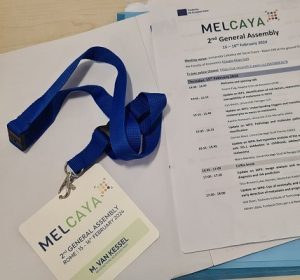 Work Package 1 (research in Germany): The objective of the first work package is to identify environmental factors (climate and air pollution) and genetic factors influencing the risk of developing melanoma in young adults (CAYA). This information will then be used to develop prevention strategies for melanoma.
Work Package 1 (research in Germany): The objective of the first work package is to identify environmental factors (climate and air pollution) and genetic factors influencing the risk of developing melanoma in young adults (CAYA). This information will then be used to develop prevention strategies for melanoma.
Pathology and cell research
Work Packages 2-3 (France/Spain/Italy): Pathology and molecular and cellular research into transitions between benign and malignant states.
Work Package 4: Analysis of activity and efficacy of new immune-based therapies in CAYA melanoma treatment.
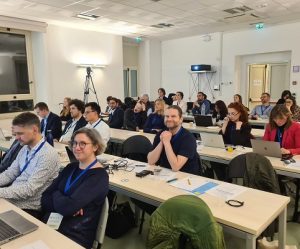
IT technology
Work Package 5: (research in Germany) focuses on Artificial Intelligence for early melanoma diagnosis and prediction of risk.
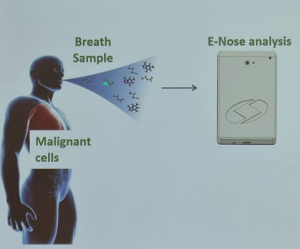 Work Package 6: (research in Israel) researches techniques to detect melanoma metastases through analysis of exhaled breath or volatile substances emitted from the skin. The device they are developing for this purpose will be called a Breath Analyzer Device (BAN).
Work Package 6: (research in Israel) researches techniques to detect melanoma metastases through analysis of exhaled breath or volatile substances emitted from the skin. The device they are developing for this purpose will be called a Breath Analyzer Device (BAN).
Medical Healthcare for (pediatric) melanoma
This project links multiple studies together, and Work Package 10 is devoted to project management. Based on trust and a lot of paperwork, partners will share their data in a large GDPR-compliant database located in Barcelona. This will benefit research with limited data and patient-based resources.
In conclusions
It was a valuable meeting to attend. This gathering provided us with a better understanding of what this project entails. We learned about the challenges researchers face, such as insufficient data. Due to European regulations, it is very difficult for hospitals to share patient data. Patients must give consent for this. We will explore if we can contribute to addressing this issue.
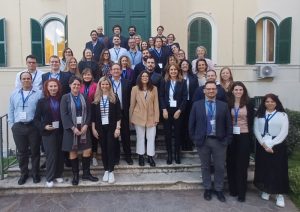
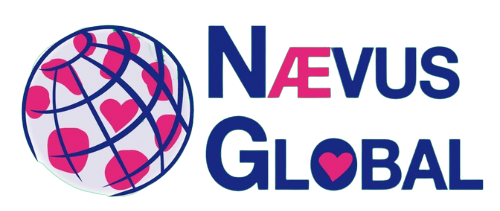
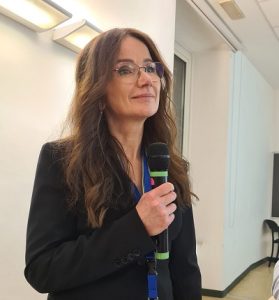 Work Package 9: (presentation by Violeta Astratinei, Romania/Europe). Incorporating patient experiences and advocacy into the research.Involves Patient Engagement in research, Education, and Advocacy. Present for this were Violeta Astratinei (Melanoma Romania, Stichting Melanoom and Melanoma Patient Network Europe), Benjamin Loffler (Nävus Network, Germany), and Marjolein van Kessel (Nevus Netwerk Nederland, the Netherlands). Violeta is organizing a design thinking workshop at MPNE, in Berlin on March 22-24, 2024 to further investigate the barriers to melanoma prevention, early diagnosis, and treatment for children, adolescents, and young adults.
Work Package 9: (presentation by Violeta Astratinei, Romania/Europe). Incorporating patient experiences and advocacy into the research.Involves Patient Engagement in research, Education, and Advocacy. Present for this were Violeta Astratinei (Melanoma Romania, Stichting Melanoom and Melanoma Patient Network Europe), Benjamin Loffler (Nävus Network, Germany), and Marjolein van Kessel (Nevus Netwerk Nederland, the Netherlands). Violeta is organizing a design thinking workshop at MPNE, in Berlin on March 22-24, 2024 to further investigate the barriers to melanoma prevention, early diagnosis, and treatment for children, adolescents, and young adults.